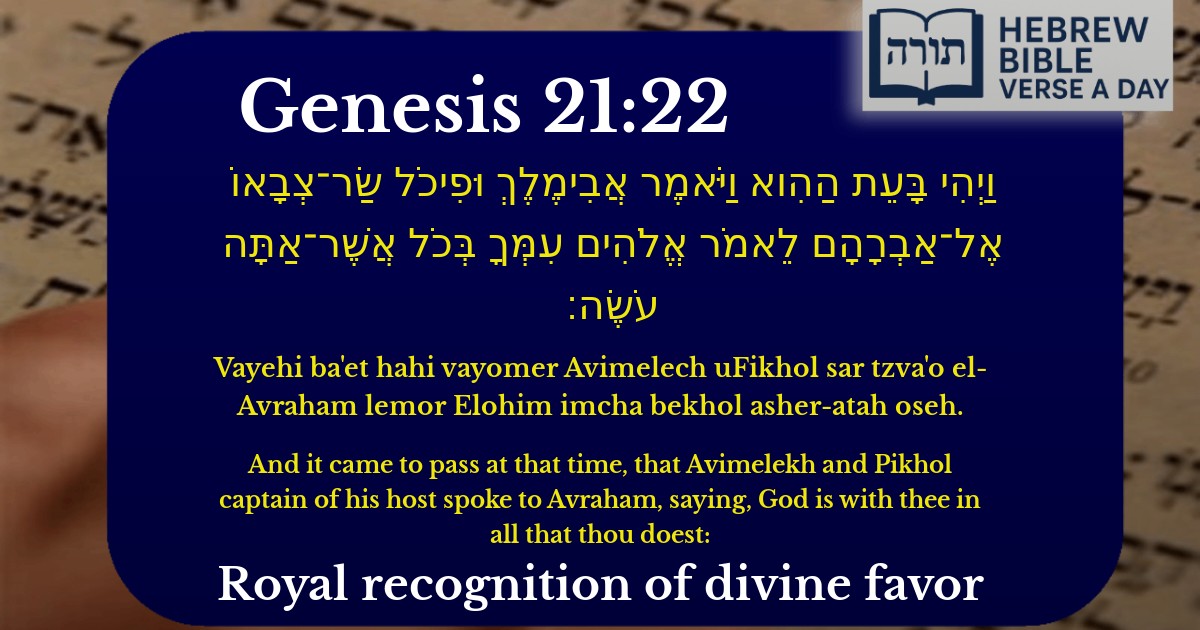Join Our Newsletter To Be Informed When New Videos Are Posted
Join the thousands of fellow Studends who rely on our videos to learn how to read the bible in Hebrew for free!
Hebrew Text
וַיְהִי בָּעֵת הַהִוא וַיֹּאמֶר אֲבִימֶלֶךְ וּפִיכֹל שַׂר־צְבָאוֹ אֶל־אַבְרָהָם לֵאמֹר אֱלֹהִים עִמְּךָ בְּכֹל אֲשֶׁר־אַתָּה עֹשֶׂה׃
English Translation
And it came to pass at that time, that Avimelekh and Pikhol captain of his host spoke to Avraham, saying, God is with thee in all that thou doest:
Transliteration
Vayehi ba'et hahi vayomer Avimelech uFikhol sar tzva'o el-Avraham lemor Elohim imcha bekhol asher-atah oseh.
Hebrew Leining Text
וַֽיְהִי֙ בָּעֵ֣ת הַהִ֔וא וַיֹּ֣אמֶר אֲבִימֶ֗לֶךְ וּפִיכֹל֙ שַׂר־צְבָא֔וֹ אֶל־אַבְרָהָ֖ם לֵאמֹ֑ר אֱלֹהִ֣ים עִמְּךָ֔ בְּכֹ֥ל אֲשֶׁר־אַתָּ֖ה עֹשֶֽׂה׃
וַֽיְהִי֙ בָּעֵ֣ת הַהִ֔וא וַיֹּ֣אמֶר אֲבִימֶ֗לֶךְ וּפִיכֹל֙ שַׂר־צְבָא֔וֹ אֶל־אַבְרָהָ֖ם לֵאמֹ֑ר אֱלֹהִ֣ים עִמְּךָ֔ בְּכֹ֥ל אֲשֶׁר־אַתָּ֖ה עֹשֶֽׂה׃
🎵 Listen to leining
Parasha Commentary
📚 Talmud Citations
This verse is not quoted in the Talmud.


Context of the Verse
This verse (Bereshit 21:22) appears after Avraham's interactions with Avimelekh, king of Gerar, and the resolution of their dispute over the wells. Avimelekh acknowledges Avraham's divine favor, recognizing that Hashem is with him in all his endeavors. This recognition comes after witnessing Avraham's success and the miraculous nature of his life.
Rashi's Commentary
Rashi explains that Avimelekh and Pikhol observed that everything Avraham did was blessed and successful. They saw that when Avraham planted trees in Be'er Sheva, they grew immediately (as hinted in the next verse, 21:33). This miraculous growth demonstrated that divine providence accompanied Avraham's actions. Rashi also notes that Pikhol's name ("Peh-kol" – "mouth of all") suggests he was the spokesman for Avimelekh's army, emphasizing the formal diplomatic nature of their statement.
Rambam's Perspective
Rambam (Moreh Nevuchim 3:24) discusses how Avraham's righteousness and adherence to divine wisdom caused even foreign kings to recognize Hashem's presence in his life. This aligns with the principle that a tzaddik's deeds sanctify Hashem's name publicly, leading others to acknowledge divine providence.
Midrashic Insights
Theological Implications
The declaration by Avimelekh highlights a key theme in Avraham's life: his role as a conduit for kiddush Hashem (sanctification of God's name). Even those outside the covenant recognized Hashem's hand in Avraham's life, fulfilling the promise that through him, "all the families of the earth shall be blessed" (Bereshit 12:3). This verse thus serves as a testimony to Avraham's successful mission of spreading awareness of the One God.